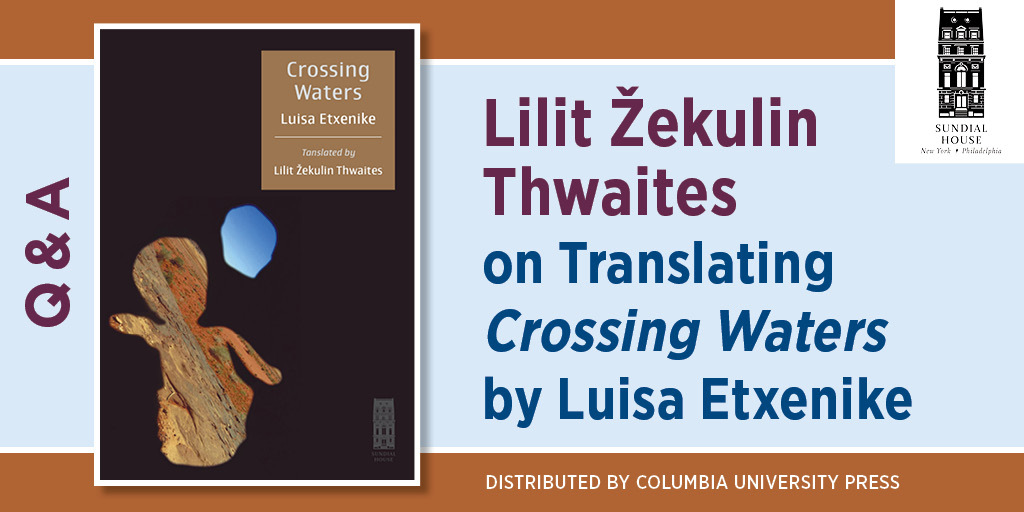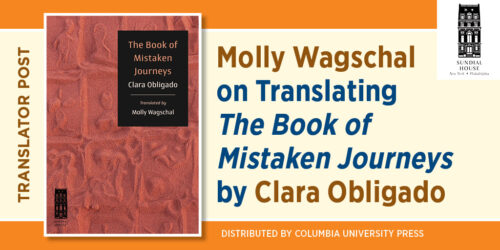Lilit Žekulin Thwaites on Translating Crossing Waters by Luisa Etxenike

Lilit Žekulin Thwaites is an award-winning Australian literary translator of novels, short stories, poetry, and essays. Luisa Etxenike is an acclaimed author from the Basque Country whose works offer insightful, moving perspectives on unorthodox topics. They recently collaborated on an English translation of Etxenike’s novel Cruzar el agua (Crossing Waters).
Q: How did you and Luisa Etxenike begin working together?
Lilit Thwaites: The owner of Pròleg Llibreria, a feminist bookshop in Barcelona, recommended Basque writer Luisa Extenike’s 1996 novel Efectos secundarios.to me in the year 2000. I was immediately intrigued by the novel, not just because of the topics Luisa was addressing—in this case, a love triangle with complications—but because of the sensitive yet direct way in which she approached them.
At the time I was doing academic research on contemporary women writers of Spain, particularly those from what used to be referred to as Spain’s periphery, that is, the Basque Country, Galicia, and Catalonia. Luisa’s way with words reminded me of other women writers I was reading and studying who were confronting similarly “taboo” topics, writers such as Carme Riera and Esther Tusquets.
Luisa challenges her reader (and her translator) at every level—linguistic, thematic, physical, emotional, intellectual and cultural—but she never loses sight of the fact that writing is a dialogue between author and reader, which must stimulate and give pleasure to both. Words and narrative are the key: she is the first to admit that literature inspires and excites her because words seduce her. And the topics on which she focuses are universal and yet specific to a writer from the Basque Country.
After reading that first novel, I contacted Luisa in Donostia–San Sebastián and have been enjoying and occasionally translating her work ever since. We have collaborated in a number of ways and have always found the experience productive. During a 2014 translator-author residency with Art Omi in the United States, for example, we worked together on translating her 2009 novel El ángulo ciego (The blind spot)—we’re still looking for, and hoping to find, a publisher for this translation. Crossing Waters is our most recent venture and, thanks to Sundial House, now a published one!
Q: Can you tell us a little more about Etxenike?
Thwaites: Luisa is a highly regarded, award-winning writer. She is the author of nine novels, three plays, one poetry collection, and two short story collections, several of which have won important literary prizes. Her work has been studied and taught by academics and scholars in many countries including Spain, France, the United States, the United Kingdom, and Australia. She has been translated into several languages, but surprisingly little of her work is available in English. Crossing Waters is the first novel to be published in English under Luisa’s name.
Luisa has a legal background, is fluent in French and English, and regularly contributes opinion pieces, essays, and reviews to European print, radio, and digital media, such as El País, El Mundo, Cadena SER-Euskadi, and Canal Europa. She organizes writing workshops, teaches courses on gender studies and narrative theory, has been a visiting scholar at several U.S. universities, and coordinates an annual writers festival in Donostia–San Sebastián, Un mundo de escritoras. She also has translated a number of French authors into Spanish and, most recently, written a noir novel (Llevar en la piel, 2023) under the name Antonia Lassa.
Luisa’s website provides details of all her books and publications, as well as links to interviews, articles, and scholarly studies written by her and about her work.
Q: What themes do we find in Etxenike’s work more broadly, and in Crossing Waters in particular?
Thwaites: Luisa often invests universal themes (love, hate, self-discovery, identity, connections) with nuances—limits, boundaries, marginalisation, exclusion—that reflect her Basque roots and the formative impacts of Spanish and French culture. She doesn’t eschew politically “sensitive” topics (e.g., terrorism in the Basque region), instead frequently approaching them from unexpected perspectives. Other constants in her work are the confrontation between human nature on the one hand and the forces of nature on the other, and a preoccupation with voice, silence, and solitude.
Crossing Waters contains several of these themes and elements. The novel is a powerful reflection on the need to avoid nostalgia, to move forward, and to grow and adapt to new situations and environments. It presents a multifaceted, fractured, sensory world—a world where, for the three main characters, past and present collide on two continents separated by a wide stretch of water (one of several reflections of the title); a positive future for each of the three is at least foreshadowed.
Q: Can you tell us more about the trio of main characters?
Thwaites: Irene is a well-known dress designer in a coastal city in the Basque Country, who has been left blind after a car accident and is unsure if her current, risk-taking life is worth continuing. Manuela is a young woman who has left behind overwhelming and degrading experiences in her native Colombia and has emigrated to that same coastal city, where she finds work as Irene’s housekeeper while she searches for a way forward. Juan Camilo, Manuela’s 10-year-old son, has not spoken since boarding the plane for Spain, for equally traumatic reasons that are gradually revealed. All three overcome their past traumas through courage and determination, aided by new friendships and experiences.
Q: What were the biggest challenges in translating Crossing Waters?
Thwaites: A major challenge was to convincingly capture the distinct voices and registers of the three main characters, one of whom “speaks” only in his head and by means of his tablet until the latter part of the novel. Needless to say, the fact that the characters are from different backgrounds, cultures, and generations added to this.
But it was Luisa’s language—at first glance deceptively simple, but always carefully crafted and poetic—that presented me with the greatest challenge. Like any two languages, English and Spanish do not always match, so the search for equally “simple,” at times stark, equivalents for Luisa’s own striking word combinations and phrases took time, and several drafts. Much can be suggested in Spanish by verbs that do not always require subject pronouns. And adjectives and nouns can be used in ways that avoid specifying a person’s gender. It is an entirely different matter in English, doubly so when trying to capture and reproduce Luisa’s language and narrative style. But such problems are in part why I enjoy translating. And I hope that my translation meets these—and other—challenges to the satisfaction of the English reader.
Categories:Hispanic Heritage MonthNational Translation MonthSundial HouseTranslationTranslator InterviewTranslator PostWomen in Translation
Tags:Crossing WatersHispanic Heritage Month 2024Lilit Žekulin ThwaitesLiterature in TranslationLuisa EtxenikeNTM2024Spanish Language Literature In TranslationWITMonth2025








